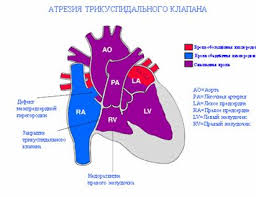
Tricuspid valve disease refers to damage to the tricuspid heart valve. This valve is located between the atrium (upper chamber) and the ventricle (lower pumping chamber) of the right side of the heart. The tricuspid valve has three cusps, or flaps, that control the direction and flow of blood. The two main types of tricuspid valve disease are:
- Tricuspid stenosis—narrowing of the tricuspid valve
- Tricuspid regurgitation—backflow of blood into the atrium from the ventricle due to improper closing of the tricuspid valve flaps
Rheumatic fever is the most common cause of tricuspid valve disease. Other causes include:
- Congenital heart problems
- Heart attack or coronary heart disease
- Congestive heart failure
- Endocarditis
- Trauma to the heart
- Tumors—rare
Factors that increase your chance of getting tricuspid valve disease include:
- History of rheumatic fever
- Sex: female—for tricuspid stenosis
In many cases, there are no symptoms. However, if symptoms do occur, they may include:
- Difficulty breathing
- Fatigue
- Sensation of rapid or irregular heartbeat
- Swelling in the legs or abdomen
The doctor will ask about your symptoms and medical history. A physical exam will be done. The doctor may be alerted to tricuspid valve disease if you have a heart murmur. Images may need to be taken to examine your heart. This can be done with:
- Echocardiogram
- Chest x-ray
- Cardiac catheterization
Your heart's electrical activity may need to be measured. This can be done withelectrocardiogram (ECG, EKG). If you have mild tricuspid valve disease, your condition will need to be monitored, but may not need treatment right away. When symptoms become more severe, treatments may include: Medications may be prescribed to treat specific symptoms associated with tricuspid valve disease. These medications include:
- Drugs to control heart arrhythmias
- Diuretics to promote the production of urine
- Vasodilators, which dilate blood vessels
If tricuspid valve disease is causing severe problems, surgery to repair or replace the valve may be required. Tricuspid valve disease cannot be prevented. But, there are several things you can do to try to avoid some of the complications:
- Treat strep throat infections right away to avoid rheumatic fever, which can cause scarring of the heart valve.
- If your valve problem was caused by rheumatic fever, talk to your doctor about antibiotic treatment to prevent future episodes.
- Most people with a tricuspid valve defect do not need to take antibiotics to prevent infections before dental or medical procedures. But, there are exceptions. Check with your doctor to see if your condition requires you take antibiotics.

